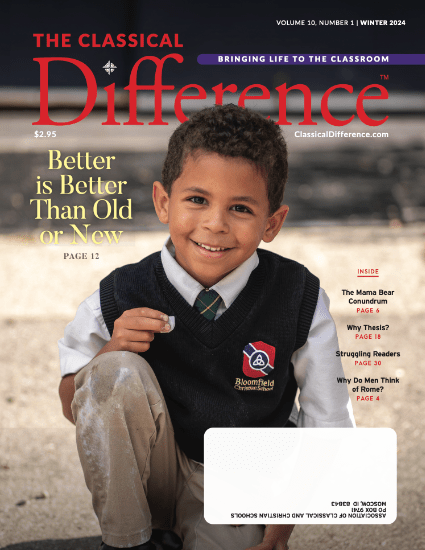by Jennifer Kau | Spring 2017
Finding Freedom in Lent
Five years ago, a young, rag-tag family of six emerged from a mid-week service smelling strongly of scented oil and looking like they’d been to some kind of wild concert.

Rockbridge Academy, Millersville, MD
Smudged, black crosses marked all their brows, right down to the toddler, whose cross at this point was a huge black smear across her round, cheerful face. They walked to the car, quiet, except for the occasional giggle at the strangeness of it all. So marked the start of our first Lent.
With children in pre–K, kinder, 1st, and 2nd, and a husband who had taught 12 different classes in three years at our classical school, we were running on empty. We’d heard of Ash Wednesday and Lent, but this was a new experience for us. Oh, how we needed Jesus! And oh, how He drew near that Lenten season.
Scripture often pairs fasting with prayer and repentance. For us—parents, teachers, and students—Lent is an opportunity to create need (fast) by setting something aside such as eating a meal, or buying coffee, or eating sweets, or using electronics. In that void, we pray and listen; we meditate on His words of life, making room for change. In this season we become familiar with our ever-present need; we identify with the suffering of Christ and his dependence on our Father in Heaven.
From the time of the early church, Christians have walked with Christ through the calendar year by intentionally observing Christian seasons. Lent is a season of turning. We turn from our natural, idle preoccupations, and we turn to a Savior who is both acquainted with our need, and is qualified to heal it. We let go, so we can receive. Alexander Schmemann, in his book The Great Lent, says that Lent is like walking in a dark valley, even while the rising sun lights the tops of the mountains around us. We labor to become familiar with our deep need, looking ahead to greater victories that have been already won for us. Lent draws the Christian heart and body together into shared submission to Christ … to a merciful Savior, abounding in steadfast love, familiar with our need, and abundant in power to save!
Lent is an ancient Christian tradition with roots as far back as AD 325. Observed by both Catholic and Protestant Christians, and beginning on Ash Wednesday, it is a season of fasting and penitence observed in the (approximately) 40 days before Easter. By comparison, the Christian season of Easter is historically celebrated for 49 days (seven weeks)!
A Practical Guide to Lent
• FASTING is a bodily discipline for an inward pursuit. As such, Scripture warns against bragging about the fast. However, as we are many members of one body in Christ together, we see goodness in walking in spiritual disciplines together. This means that we have the freedom to fast together as a family, or even in agreement as a small group of friends or a church body.
• FOOD*: Consider fasting one day of the week (e.g., Fridays throughout Lent), or for one meal a day, or from a specific food item (alcohol, coffee, sweets, etc.). Spend that time in solitude with your Bible, or in praying a penitential Psalm (Psalm 6, 32, 38, 51, 102, 130, 143). Ask the Lord for His continued work of mercy in your life.
• TIME: Take a break from distractions like TV, Facebook, surfing the web, and pleasure reading. A family could fast from TV and instead read a Gospel aloud and talk about it, or play a game together. We are often unknowingly preoccupied; intentionally giving honor to God-given relationships brings blessing in a fast.
• GROUP: Consider fasting as a small-group from spending money in restaurants. Come together once a week and pray for one another, build community, share transparently the work God is doing in each individual life. Save the unspent money from Lenten season, and give it to a community shelter or pregnancy center.
• FEASTING: We do not fast on Sundays in Lent, as they are feast days. Sundays are always mini-Easters … a weekly remembrance that Christ has accomplished our victory. Just as Christ taught us: we do not fast while with the Bridegroom … but we feast in His presence!
*Children should not skip meals on a regular basis. If children have an understand- ing of fasting, and want to participate, perhaps a fast from a certain type of food or activity would be a good consideration (e.g., sweets or video game time). ![]()
JENNIFER KAU is a mom of four, grades 2nd–8th. She and her husband Arron, dean of mathematics at Covenant Classical School, live in Fort Worth, TX.












